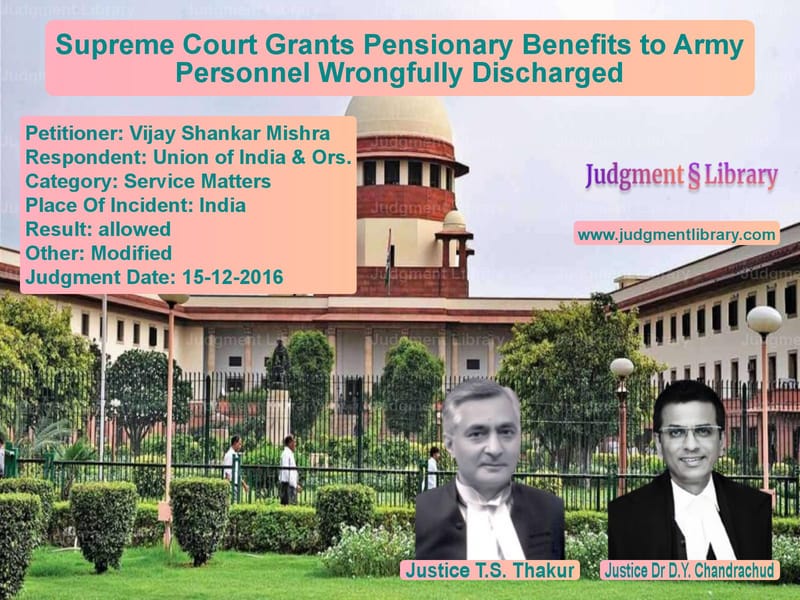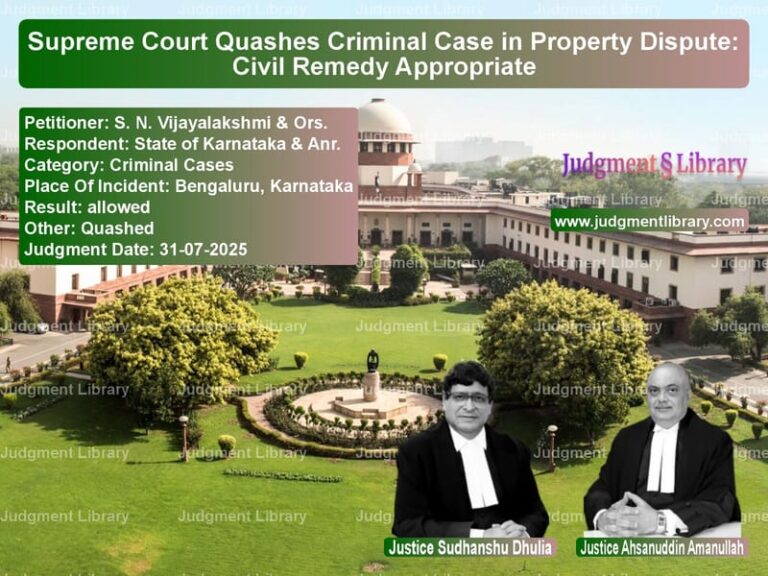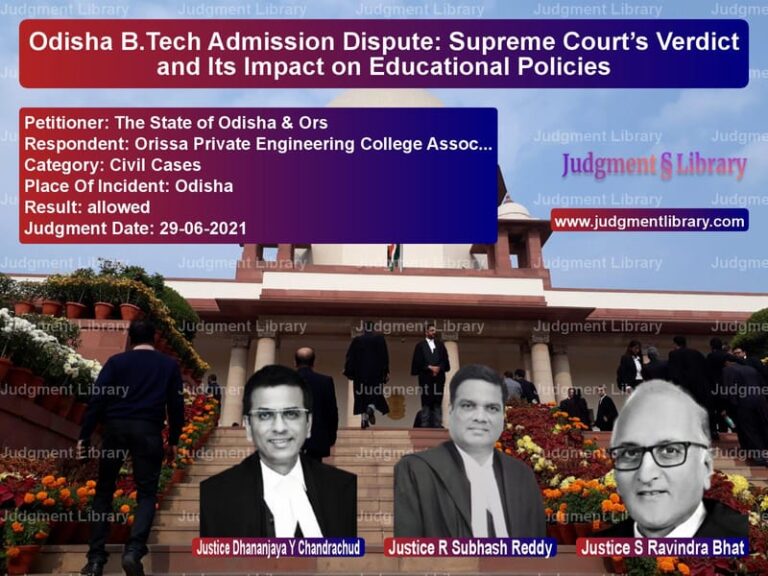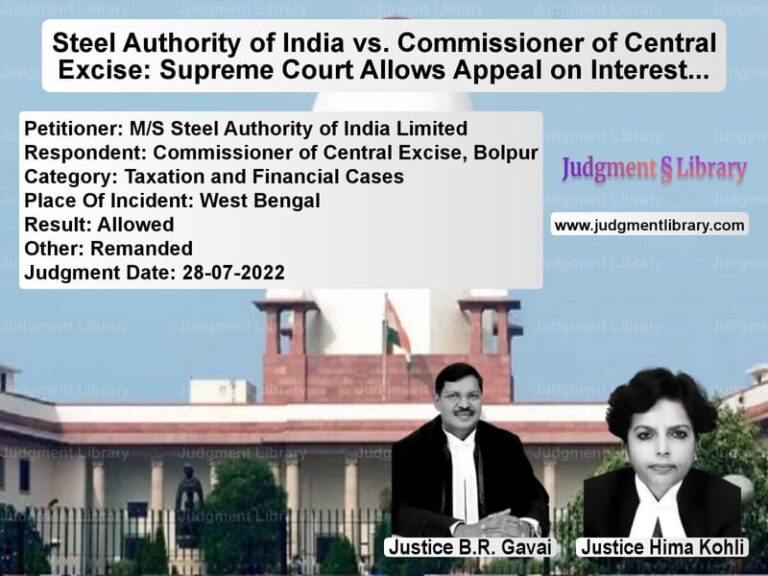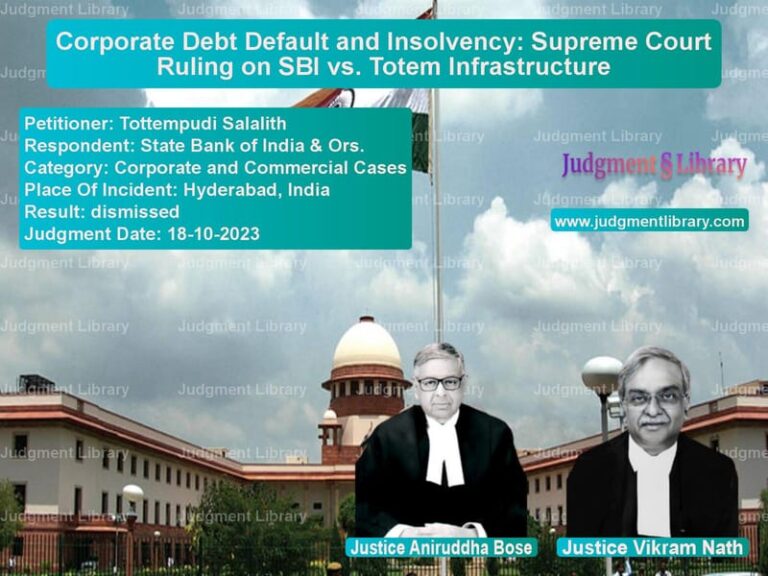Supreme Court Grants Pensionary Benefits to Army Personnel Wrongfully Discharged
The case of Vijay Shankar Mishra vs. Union of India & Ors. revolved around the wrongful discharge of an Army Medical Corps personnel before completing his pensionable service. The Supreme Court ruled in favor of the appellant, holding that his discharge without due consideration of relevant factors was improper and granted him pensionary benefits.
Background of the Case
The appellant, Vijay Shankar Mishra, was enrolled in the Army Medical Corps on 23 June 1984. On 3 October 1997, a show cause notice was issued to him under Rule 13(3)III(v) of the Army Rules, citing unsatisfactory conduct. On 15 October 1997, he was placed in a low medical category due to primary hypertension and was subsequently discharged from service on 4 December 1998.
At the time of his discharge, the appellant had served for 13 years, 8 months, and 19 days, excluding 188 days of non-qualifying service. Since the minimum service required for pension eligibility under Rule 132 of the Pension Regulations for the Army, 1961 (Part-I) was 15 years, he was denied pension.
On 22 May 1999, his request for disability pension was also rejected, citing his six red ink entries as a justification for discharge.
Legal Proceedings
- The appellant initially filed a writ petition before the Madhya Pradesh High Court, which was dismissed on 21 November 2006.
- On appeal, a Division Bench directed reconsideration of his case in light of Army Headquarters Circular No. 0201/A/164/Admn-1 dated 10 January 1989.
- Following this order, the Army again rejected his pension claim on 26 February 2007, citing that he was discharged due to being unlikely to become an efficient soldier.
- The appellant then approached the Armed Forces Tribunal (AFT) in 2010, which dismissed his petition on 23 September 2010.
- In 2011, he filed a review application before the AFT, which was rejected on 15 September 2011.
- His subsequent writ petition before the Madhya Pradesh High Court was dismissed on 4 July 2012, directing him to seek relief from the Supreme Court.
- The appellant’s plea for leave to appeal before the Supreme Court was initially rejected due to delay but was later granted under Civil Appeal Nos. 12179-12180 of 2016.
Arguments by the Petitioner
- The petitioner argued that his discharge before completing pensionable service was grossly disproportionate and unfair.
- He relied on the Army Circular No. 0201/A/164/Admn-1, which provides that discharge due to four red ink entries is not mandatory, and due consideration must be given to long service, difficult postings, and service hardship.
- He contended that the mere award of six red ink entries did not justify his discharge.
Arguments by the Respondents
- The Army contended that the appellant’s disciplinary record, including six red ink entries, made him unsuitable for retention.
- It was argued that his discharge was in accordance with Rule 13(3)III(v) of the Army Rules.
- The respondents justified the denial of pension on the grounds that he had not completed 15 years of service.
Supreme Court’s Judgment
The Supreme Court found that the authorities had failed to apply their mind to the relevant factors while discharging the appellant. The Court cited its previous ruling in Veerendra Kumar Dubey vs. Chief of Army Staff (2016) 2 SCC 627, which held:
“The mere award of four red ink entries does not render discharge mandatory. The competent authority must assess the nature of the offenses, length of service, and the conditions endured by the personnel.”
The Supreme Court’s key observations included:
- The authorities did not consider whether the offenses leading to red ink entries were serious enough to warrant dismissal.
- The Army failed to take into account the appellant’s long service and postings in difficult areas.
- Even after the Madhya Pradesh High Court directed reconsideration, the Army merely reiterated its earlier decision without proper analysis.
On these grounds, the Court ruled that the appellant had been unfairly discharged and was entitled to pensionary benefits.
Relief Granted
- The Supreme Court set aside the orders of the AFT dated 23 September 2010 and 15 September 2011.
- It directed that the appellant be treated as having been in service until he completed the qualifying service for pension.
- The appellant was granted continuity of service for pension purposes, though no back wages were awarded.
- The monetary benefits, including pension, were ordered to be released within four months.
Impact of the Judgment
- The ruling reinforces the principle that Army personnel cannot be arbitrarily discharged based on disciplinary records without considering all relevant factors.
- It sets a precedent for fair treatment of soldiers, especially those nearing pensionable service.
- The case highlights the need for authorities to apply their minds while exercising discretionary powers under Army Rules.
Conclusion
The Supreme Court’s decision ensures that Army personnel are not unfairly denied pensionary benefits due to technicalities. The ruling reaffirms that authorities must exercise discretion judiciously, considering the soldier’s overall service record before passing discharge orders.
Don’t miss out on the full details! Download the complete judgment in PDF format below and gain valuable insights instantly!
Download Judgment: Vijay Shankar Mishra vs Union of India & Ors Supreme Court of India Judgment Dated 15-12-2016.pdf
Direct Downlaod Judgment: Direct downlaod this Judgment
See all petitions in Pension and Gratuity
See all petitions in Judgment by T.S. Thakur
See all petitions in Judgment by Dhananjaya Y Chandrachud
See all petitions in allowed
See all petitions in Modified
See all petitions in supreme court of India judgments December 2016
See all petitions in 2016 judgments
See all posts in Service Matters Category
See all allowed petitions in Service Matters Category
See all Dismissed petitions in Service Matters Category
See all partially allowed petitions in Service Matters Category

